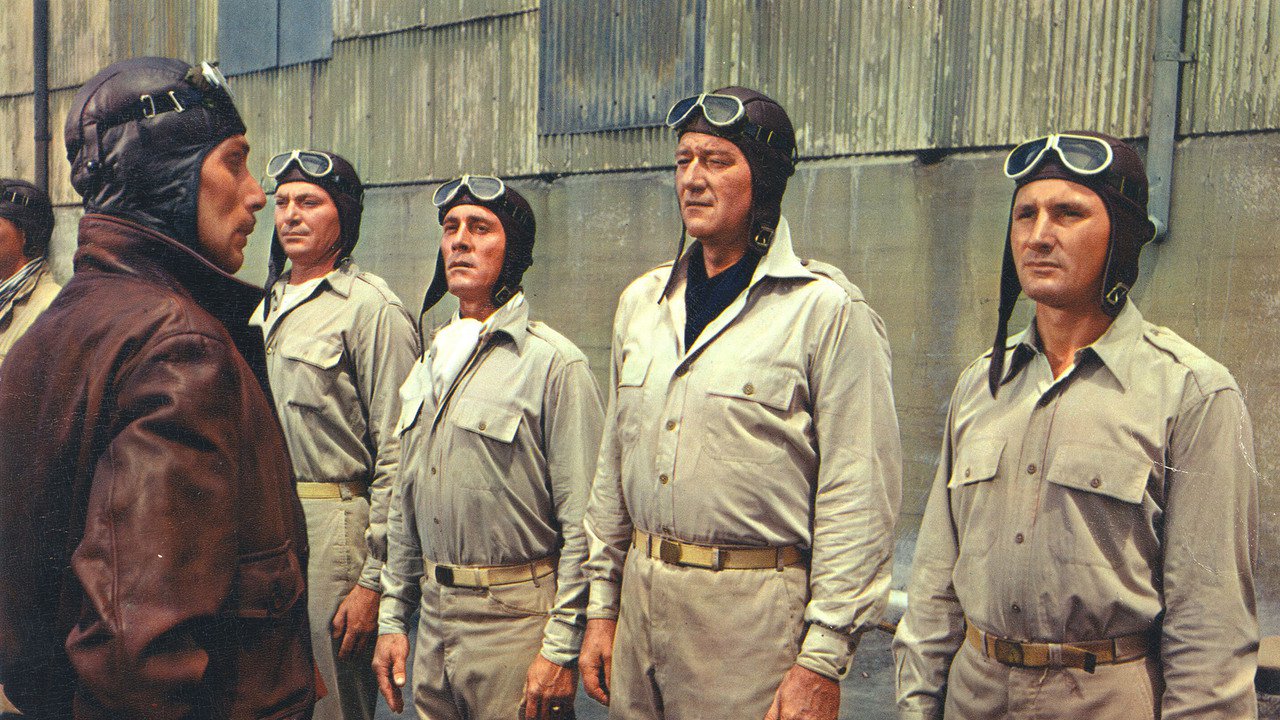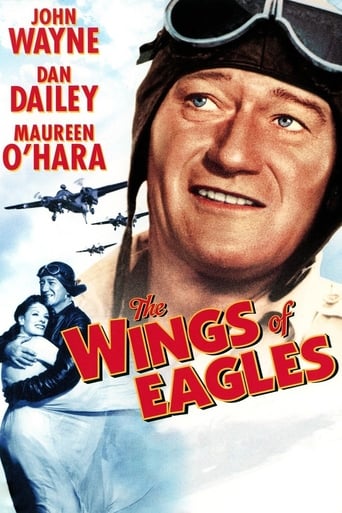



You won't be disappointed!
Although I seem to have had higher expectations than I thought, the movie is super entertaining.
View MoreThe biggest problem with this movie is it’s a little better than you think it might be, which somehow makes it worse. As in, it takes itself a bit too seriously, which makes most of the movie feel kind of dull.
View MoreThe film may be flawed, but its message is not.
. . . is the main refrain of the theme song for THE WINGS OF EAGLES (repeated 75 or 80 times). This flick supposedly covers 20 years or so of a U.S. Naval Aviator's Real Life. The Fiftyish John Wayne is NOT very convincing portraying this "Spig" character in Spig's Early Twenties. Later, when a totally broken-down Spig hobbles into a movie director's office 10 or 15 years later, the walls are festooned with studio stills of a Young JOHN WAYNE (!) attired in cowboy gear. This may be intended as an "inside joke," but it mostly serves to make viewers wish that they were watching THAT edition of Wayne, as opposed to the boring loser who spends half an hour in the middle of this flick strapped face-down, trying to move one toe. Has Enemy Action put Spig in this predicament? No, he's apparently too drunk to get to his own bathroom in the middle of the night without falling down his own home's stairs. Spig is only shown flying once during THE WINGS OF EAGLES, and he totals the training plane that U.S. taxpayers bought him at the end of a brief joyride. Otherwise, Spig just brawls with Army guys, avoids his wife, and chain-smokes. (His alcoholic spouse has no inkling that Spig's only son is a couple minutes from a death apparently brought on by second-hand smoke!) The final outcome of World War Two will be thrown into doubt (even for History Majors!) when they see that the American Military feels a need to press Spig into service toward the end of THE WINGS OF EAGLES.
View MoreAs much I as tried to like this movie, I could not, not because of the subject of the the story nor because of how the movie was made, but because of John Wayne. Mr. Wayne was miscast for the role. His performance as a hot-headed naval aviator who battles adversity was unconvincing. Not that his performance is poor, he just did not seem right for the role and to me that proved to be the movie's undoing. Dan Dailey's performance also stretches credulity, but one can make allowances for a supporting role. There is no doubt that Frank Wead had a dynamic life, but there was more to him then that. He seemed to be a complex person who was much more than an acting out swashbuckler as portrayed in the movie. He was trying to juggle his devotion to duty with the needs of his family, which proved to be insurmountable for him. John Wayne's attempt to portray such a person comes off as phony because Mr. Wayne plays characters who are bold and decisive, an image that Mr. Wayne cannot shake in this movie.
View MoreWhenever my father would come home on leave from the Air Force, I could count on being taken to at least one movie. There were two that I remembered vividly. One was "The Joker Is Wild", memorable for the scene where Sinatra is beaten and his throat slashed. The other was this film, and what I specifically remembered was the final scene where Frank Wead is transferred from his ship to another to be retired. I haven't seen the film since 1957 until tonight in 2011...54 years...but I still remembered that scene so well.However, I have a lot of problems with this film. And the biggest problem is -- is this really the way our men in the military behaved back then? If so, I've lost a lot of respect for our military back then. No discipline, frequent drunken fights, and so forth. It's an embarrassment. Or, did John Ford just try to make it a good and fun story? But, perhaps our sense of what is good and admirable in American life has changed over the past 54 years. As I watched this film, what was mostly on my mind was what a lousy husband and father Frank Wead was...at least as portrayed in this film.John Wayne did quite an admirable job acting here, particularly because it is not the kind of role -- a cripple -- that we usually associate with Wayne. Maureen O'Hara, lovely as ever, got cheated here. But, as the old saying goes, "They also serve who only stand and wait." Perhaps, next to Wayne, the best portrayal goes to Dan Dailey.Maureen O'Hara and John Wayne were excellent together, although of their pairings this is my least favorite.In the past year or so I've reexamined quite a few of John Wayne's films, and overall I'm more impressed than I remembered. However, I'm not overly impressed with this film, even though it's based on a true story. If you haven't seen this film, and you like Wayne at all, you ought to watch it...at least once. Yet, I cannot recommend it as one of Wayne's better films. But, it is a good -- and different -- performance by the Duke.
View MoreAll the critics have called John Ford's humor "broad" and I guess this is a pretty good example of what they mean. The opening scenes involve ancient float planes, a Stutz Bearcat, people falling into water, and a crash into the swimming pool at the Admiral's tea party. (Tea party!) Subsequent scenes involve gala fist fights between matched hordes of Army and Navy pilots, led by Kenneth Toby and Wayne respectively. There are cakes smashed into faces. The whole thing could have been a silent comedy.And yet the humor, by no means ever sophisticated, is pretty funny at times, and not always slapstick either. A good example is the scene in Spig Wead's (John Wayne's) office, with Pincus (Tige Andrews) and Carson (Dan Dailey). Dailey is having difficulty trying to make a long-distance call. Andrews is sitting with his shoe off. Wayne asks what's wrong, did he stub his toe? "Ah, no," says Andrews, "ya see, I keep my money in my shoe and every time I step on it --" and he's interrupted when Admiral Moffat enters the room. Wayne, Dailey, and Andrews snap to attention and listen to the Admiral's speech. There is a brief pause after Dailey suddenly shouts into the phone, "Why don't you GET OFF THE PHONE, you dumb head!" In the sudden silence everyone stares at Dailey who then looks embarrassed and apologizes to the Admiral. When the Admiral has finished his speech to his respectful listeners he turns to leave the room and notices Pincus, a mere enlisted man, goes over to him and greets Pincus warmly. Pincus smiles easily, shakes the Admiral's hand, and inquires after his family. "How's da wife, sir? And dem lovely kiddies?" "Fine, fine. Good to see you, Pincus," says the Admiral and exits. Wayne and Dailey gape speechless at Pincus before getting back to business.I've described this scene in extenso because it could NOT have come from a silent comedy. None of the humor is physical. It's what might be called interactional humor. And Ford explains absolutely none of it. We have no idea why Dailey began shouting into the phone during the Admiral's speech, or what the hell kind of background the Admiral and the lowly Pincus share. There is no set-up for the gags whatever. They come as a shocking surprise and that's what makes them funny.There's a similar unstated quality at the climax of the film. Dailey has saved Wayne's life by taking the bullets himself. He winds up in sick bay playing poker with the other patients. Wayne visits him to thank him. The two have been lifelong friends. Ordinarily, under these conditions, a viewer expects to see a lot of sentiment, even between two plain-speaking macho loudmouths. Instead, Dailey brushes off Wayne's thanks brusquely. And later the two don't get together for Wayne's retirement from the ship and from the Navy after a heart attack, as if Wayne were leaving a drinking party for a few minutes to visit the bathroom. The sense of loss -- of almost tragic finality -- is underscored by the absence of any emotional display. And it is left unexplained by Ford, just as Dailey's phone call and Pincus's friendship with the Admiral was. This is anything but a routine scene.It's not among Ford's best films. He wanted to call it, "The Spig Wead Story," but the studio objected that no one would want to see it and they were right. Spig Wead sounds like a quarterback for Notre Dame. And the script, following Wead's real life meandering, is all over the place, switching in the middle from a service comedy to a complicated and unfocused story about a screen writer. And it doesn't tell us much about Wead's second career. "I didn't want to make it," said Ford about the movie, "but I didn't want anybody else to make it." Probably no one else would have made it.The romance between Wayne and O'Hara is handled clumsily. They're forever breaking up and getting together again -- or almost getting together. O'Hara is, as always, drop-dead gorgeous in Technicolor. And I doubt that anyone but Ford could have forced John Wayne to doff his toupee. Yet the acting itself is schematic, partly because the dialog is so burdensome. Who could possibly have made believable Wayne's lines after he has fallen down the stairs and broken his back? "Don't move me. My back. Can't feel anything. Call . . . hospital. Navy . . . hospital." Sounds like . . . comic book. At one point in the film, Ford ridicules himself ("John Dodge") instead of someone in his cast.The director was beginning to run out of steam by this time. He was over 60 and had a lot of scar tissue. Still, the movie is worth watching.
View More